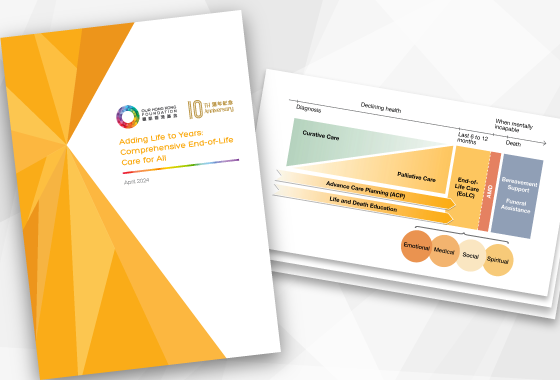Beyond the coronavirus pandemic, Hong Kong must take health and fitness more seriously
This article appeared originally in the South China Morning Post on 3 April 2020.
Authors: Amy Liu, Managing Editor at Our Hong Kong Foundation

As Covid-19 infections rise around the world, including in Hong Kong, the city’s government has toughened measures to slow the spread of the global pandemic and head off a new wave of imported infections.
Even as the community’s attention is focused on the pandemic itself, it is noteworthy that infected patients are much more likely to fall seriously ill or die if they have pre-existing chronic diseases.
It is therefore imperative that the community at large, and the government in particular, should use Covid-19 as a wake-up call to work in earnest to prevent chronic diseases both as an end in itself, and as a way to fight future pandemics.
The good news is that most Hongkongers have been disciplined about taking precautions against Covid-19, whether it involves queuing overnight for masks or washing hands regularly. These actions have not only slowed the spread of Covid-19 in the city, they have also helped cut short this year’s flu season: it lasted for just five weeks and ended in February, about two months earlier than usual.
Positive tests for seasonal flu peaked in the week ending January 25, and the number quickly fell by two-thirds just two weeks later. The hospitalisation rate also dropped sharply. In fighting the novel coronavirus, Hongkongers have also succeeded in beating seasonal flu.
Indeed, might influenza be a more frightening threat than Covid-19? According to the World Health Organisation, between three million and five million people are seriously sickened by seasonal flu every year, with sometimes over half a million deaths in a single year.
In Hong Kong, hundreds die from flu every year, with elderly people accounting for some 80 per cent of deaths. While flu is a cause, most suffer from complications of other illnesses such as pneumonia, diabetes and heart disease.
One of the reasons Covid-19 is so dangerous is the pneumonia it triggers. Already, pneumonia is the second-deadliest disease in Hong Kong, after cancer. It claimed more than 8,000 lives a year between 2015 and 2018. In 2017, 8,032 deaths from pneumonia accounted for 17.5 per cent of all deaths.
How deadly pneumonia or flu is depends on the strength of the patient’s immune system. For pneumonia in Hong Kong in 2017, the mortality rate was much higher for those above 70. Similarly, the WHO has noted that those who are at an advanced age or in poor health are most vulnerable to Covid-19.
Hong Kong has a rapidly ageing population, who will have increasing health care needs. If senior citizens are not healthy, then there will be extra pressure on the health care system. But that does not have to be the case. We advocate active ageing, or policies that help senior citizens stay fit and age healthily.
There are already institutions in Hong Kong working on helping the elderly engage in physical activities, while non-profit organisations such as the Jockey Club are organising events. Studies have shown that suitable exercise benefits senior citizens who are physically weak. As they get fitter, they have more resistance to disease.
The threat from non-infectious diseases is as serious as that from infectious diseases. According to WHO figures, 70 per cent of the 56 million who died in 2015 suffered from non-infectious diseases. In Hong Kong, Department of Health figures showed that non-infectious diseases including cancer, heart disease, stroke, diabetes and respiratory disease accounted for 55 per cent of all deaths in 2016.
As the Hong Kong population is often overworked and exercises too little, while eating unhealthy food and breathing polluted air, patients suffering strokes, or who have heart disease or diabetes, are getting younger.
Couple this with the projection that people over 65 will make up 37 per cent of the population by 2066, and the burden on our medical system is only going to get heavier.
All this relates back to the current Covid-19 crisis. Of Hong Kong’s first four fatalities, three had diabetes and one had a medical history including a stroke.
The International Diabetes Federation expects 13 per cent of the Hong Kong population, or 920,000 people, to be suffering from the disease by 2030. A 39-year-old man with diabetes was the first to die of Covid-19 in Hong Kong. When younger people suffer from chronic medical conditions, it weakens their immune system and makes them vulnerable.
We have proposed that the government implement a chronic disease management voucher scheme, providing a supplement of HK$1,000 to those who have reached the age of 45, for medical screening. According to data from the Census and Statistics Department, at the age of 45, the likelihood of individuals having at least one chronic condition rises sharply.
The scheme would help ensure early detection and prompt correction of living habits. The Department of Health reckons one-third of non-infectious diseases can be prevented by adopting healthier lifestyles.
While it is true Covid-19 is the biggest threat to public health today, seasonal flu, infectious and non-infectious diseases remain deadly on a large scale. The current pandemic is an unexpected crisis, but the other diseases are regular occurrences that most people simply fail to take adequate preventive measures against.
For Hongkongers, the harsh realities of life during an epidemic should also be a wake-up call to take their health seriously – by strengthening their immune system through better living habits, more exercise and regular check-ups.
It is also important that the government provide the support to enhance preventive measures that will ultimately save billions of dollars for our medical and health care systems.



